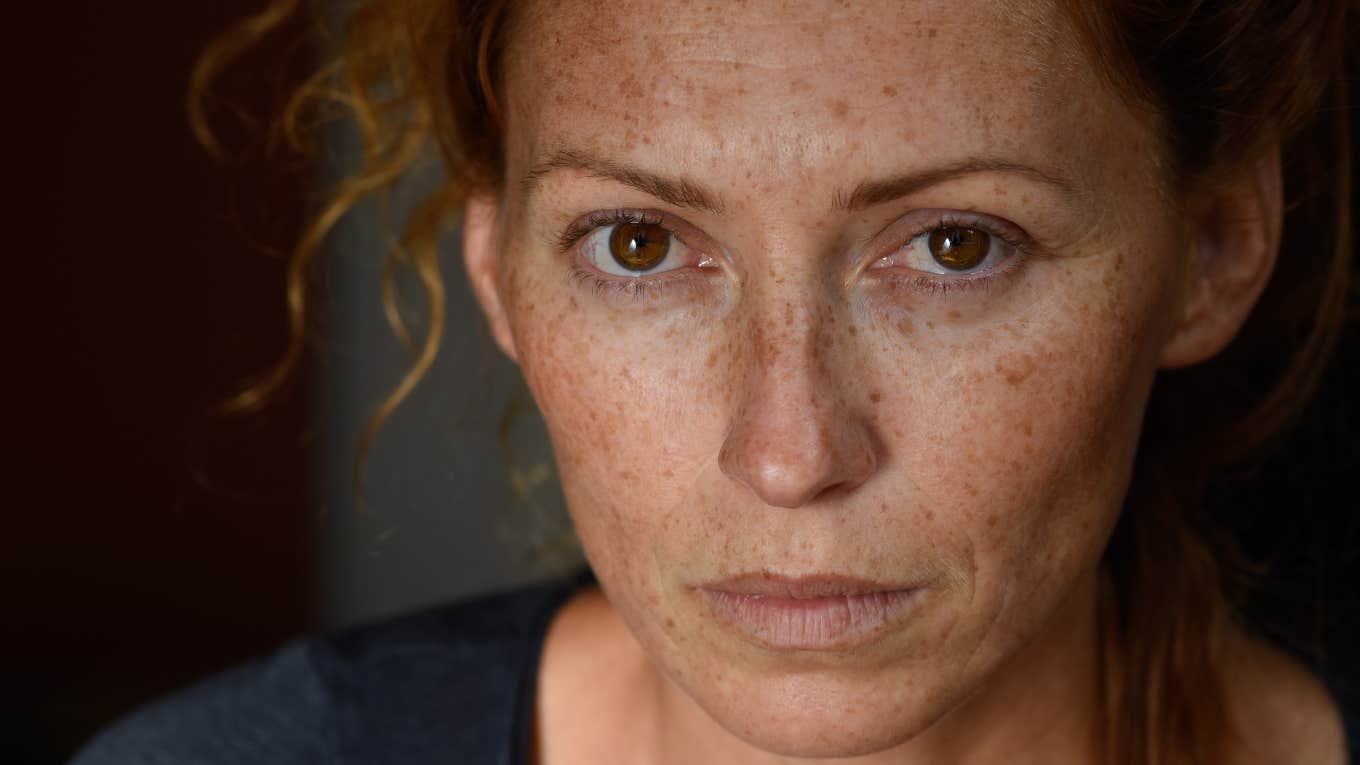8 Low-Key Signs You Had A Rough Childhood & It's Still Affecting You Today
These clues aren't always so obvious, but they stand out when you know what to look for.
 microcosmos | Shutterstock
microcosmos | Shutterstock Having a rough childhood often feels like a "takes one to know one" kind of deal. Honestly, it's actually not that type of thing at all. In many cases, it's obvious. For example, it's pretty widely known that people who become career criminals often had rough childhoods.
However, it's not always clear to see. There are plenty of highly functional people who are popular, have good relationships, and good careers but grew up in rough situations. They hide their bad childhoods like a pro.
While people hide the scars from their bad childhoods well, it's easy to spot when you know what to look for. And there are a few big giveaways that indicate you may suffer from a rough childhood.
Here are 8 low-key signs you had a rough childhood and it's still affecting you
1. You're unusually independent or unusually codependent
 Andrea Piacquadio | Pexels
Andrea Piacquadio | Pexels
If someone has had a hard childhood, the biggest giveaway is how independent they are in their day-to-day life.
Having a bad childhood tends to mean one of two things: you either were neglected as a kid, or your parents smothered you. If you were a child who was neglected or a victim of parentification, you had to act like an adult from a young age. You may have acted like the parent for an immature mom or dad.
Or, in the case of extreme neglect, you had to raise yourself because your parents were nowhere to be seen. This often means that you carry yourself with a level of maturity that isn't normal for your age.
On the other hand, if you had parents who helicoptered you or were narcissistic, you might have problems with codependency. At times, it can even manifest as Borderline Personality Disorder.
People who grew up with these kinds of parents "had their legs broken so they couldn't walk away." If this sounds like you, it's likely you became codependent because your parents basically coerced you into codependency and made you feel like you couldn't do anything without a nod from another person.
2. You don't ever talk about your family
 MART PRODUCTION | Pexels
MART PRODUCTION | Pexels
With people who had a healthy relationship with their families, you'll overhear how they recently talked to their mom or brother.
But if you had a extremely dysfunctional family, you tend to do the exact opposite, keeping mum on it. If people ask you what it was like growing up, you may even deny anything was wrong.
On a more obvious note, because you had a bad childhood, you likely severed ties with everyone from that time in your life. It's a matter of self-preservation, especially if you had abusive parents.
You may go no contact with your family members and, at times, may also choose to stop talking to childhood friends as a way to avoid revisiting the past.
3. You people-please
 Christina Morillo | Pexels
Christina Morillo | Pexels
Most people talk about "fight or flight," but they forget the two other reactions people can have to trauma: freeze and fawn. "Fawn" is a particularly telling trauma response.
When you're a person who grew up in a broken home, it's common to be a people-pleaser. It's a survival skill.
The kid whose dad might hurt them if he's displeased soon learns to walk on eggshells around him. He'll do anything to make his dad happy or keep him calm, including lying and refusing to put up boundaries.
It's a common sense reaction. Not acting like a people-pleaser around abusers can lead to potentially lethal consequences, especially when your abuser is twice the size of you or if your abuser controls your food intake.
Even if the damage isn't physical, dealing with a parent flipping out or screaming in your face if you stand up for yourself is not something any kid wants to do. As a result, people-pleasing gets awarded in these kinds of environments.
While being a people-pleaser might make your home life more tolerable as a kid, the truth is that you can't really snap out of it easily when you're outside of your home. You get stuck with that "fawn" response.
Similarly, if you had a very rough childhood, you may often allow others to abuse you or tear you down. You do it because you're used to it and often lack the self-esteem needed to walk away from people who are bad to you.
4. You apologize for everything
 Liza Summer | Pexels
Liza Summer | Pexels
This goes hand-in-hand with surviving abuse. When you have an abusive parent or partner, you get told that everything is your fault — even when it's not related to you at all.
Apologizing is often something you learn to do out of self-preservation. Your mom's angry and screamed at you? Start apologizing. The cat got sick? Start apologizing. You flinched? Apologize.
5. You either hoard food or suffer from disordered eating
 fizkes | Shutterstock
fizkes | Shutterstock
People who had horrible childhoods are affected in different ways. Take Sandra and Marcus (names have been changed) as an example. Both had very different reactions to how their experiences changed their relationship with food and their food habits.
Sandra had a mom who was a "tiger mom" type. She grew up in a world of pristine lawns, overachievement, and exclusive country clubs.
Her mom demanded perfection — and that included being pin-thin, dating Johnny Football Star, and getting into an Ivy League college. She developed anorexia and struggles with it to this day.
Marcus, on the other hand, was the polar opposite. His mother was a crackhead who had a penchant for stealing lawn chairs. She was more concerned with scoring than she was with feeding him.
As a result, Marcus learned to hoard food to prevent going to sleep on an empty stomach. He also tends to overeat, often because he still gets scared that he won't be able to afford food later on.
6. You can't remember much about your childhood
 Ivan Samkov | Pexels
Ivan Samkov | Pexels
In some instances, people who have had rough childhoods don't remember much about growing up. Perhaps you come across an old photo album of your childhood and flip through it. At one point, you may sigh and say, "I don't remember taking any of these."
When you experience really bad trauma, your brain might try to protect you by blocking memories out. Unsurprisingly, many people who had extremely abusive home lives can't remember their childhoods.
7. You're a perfectionist or are obsessed with achievements
 Andrea Piacquadio | Pexels
Andrea Piacquadio | Pexels
Most expect people who have rough childhoods to be underachieving and, in many cases, this is true. However, there is another side to a rough childhood that many people forget.
Depending on what happened in your childhood, you could end up getting obsessed with being perfect. It's not unusual to hear of children in difficult families who believe that they are only lovable if they overachieve.
One form of abuse that people don't really talk about is parents who offer conditional love based on their child's achievement. It was recently mentioned in pop culture through Jennette McCurdy's "I'm Glad My Mom Died."
People who grow up with this type of parenting often equate their achievements with how much love they deserve. And they are desperate for love, so they end up breaking their backs achieving a bunch of things in hopes of being loved and accepted.
A rough childhood is what you see whenever you hear someone say, "I earn $100,000 a year and am a corporate CEO! Why won't women love me?"
8. You clamor for attention
 Sam Lion | Pexels
Sam Lion | Pexels
Go to any classroom and find the most attention-seeking kid, and it's almost a guarantee that they have a rough life at home. The more a person clamors for attention, the more likely it is that it's a cry for help.
That's why it's surprising when people deride those who are begging for attention. If someone keeps asking for people to notice them, chances are that something went terribly wrong with them.
Attention-seeking behavior, particularly acting out, tends to be a sign of a person who grew up with extreme neglect. Getting attention is compulsory for them because they never had it when they needed it the most.
If you or someone you know has been a victim of child abuse, there are resources available to help. Visit the Childhelp National Child Abuse Hotline's website, or call 1-800-4-A-CHILD (1-800-422-4453) to speak with a crisis counselor 24/7.
Ossiana Tepfenhart is a writer based out of Red Bank, New Jersey whose work has been featured in Yahoo, BRIDES, Your Daily Dish, New Theory Magazine, and others.
